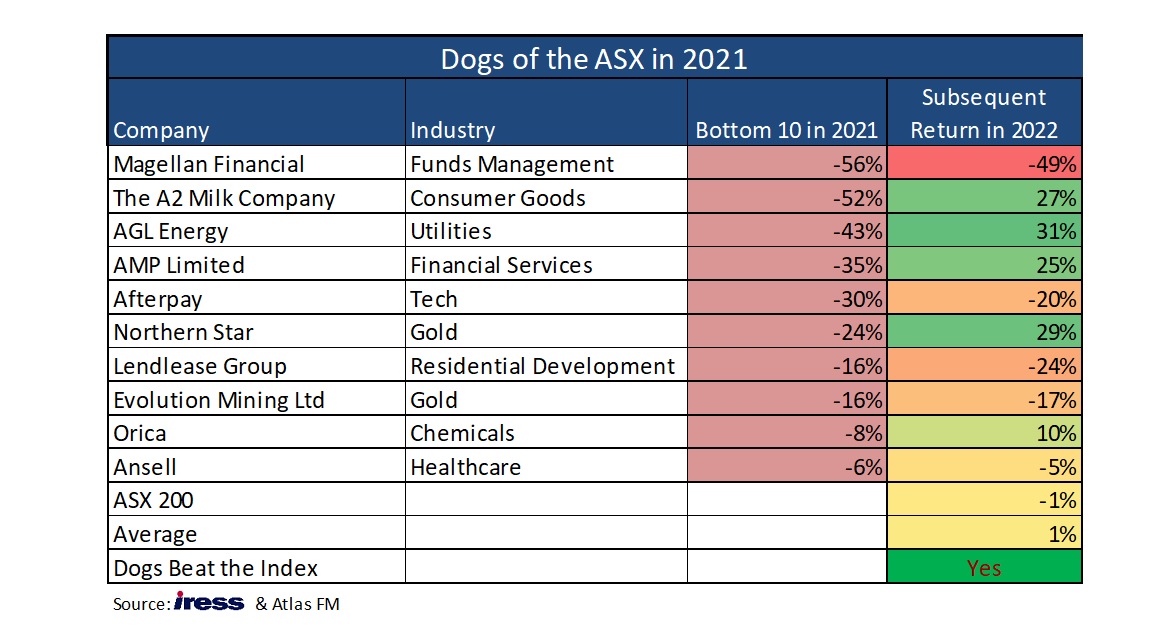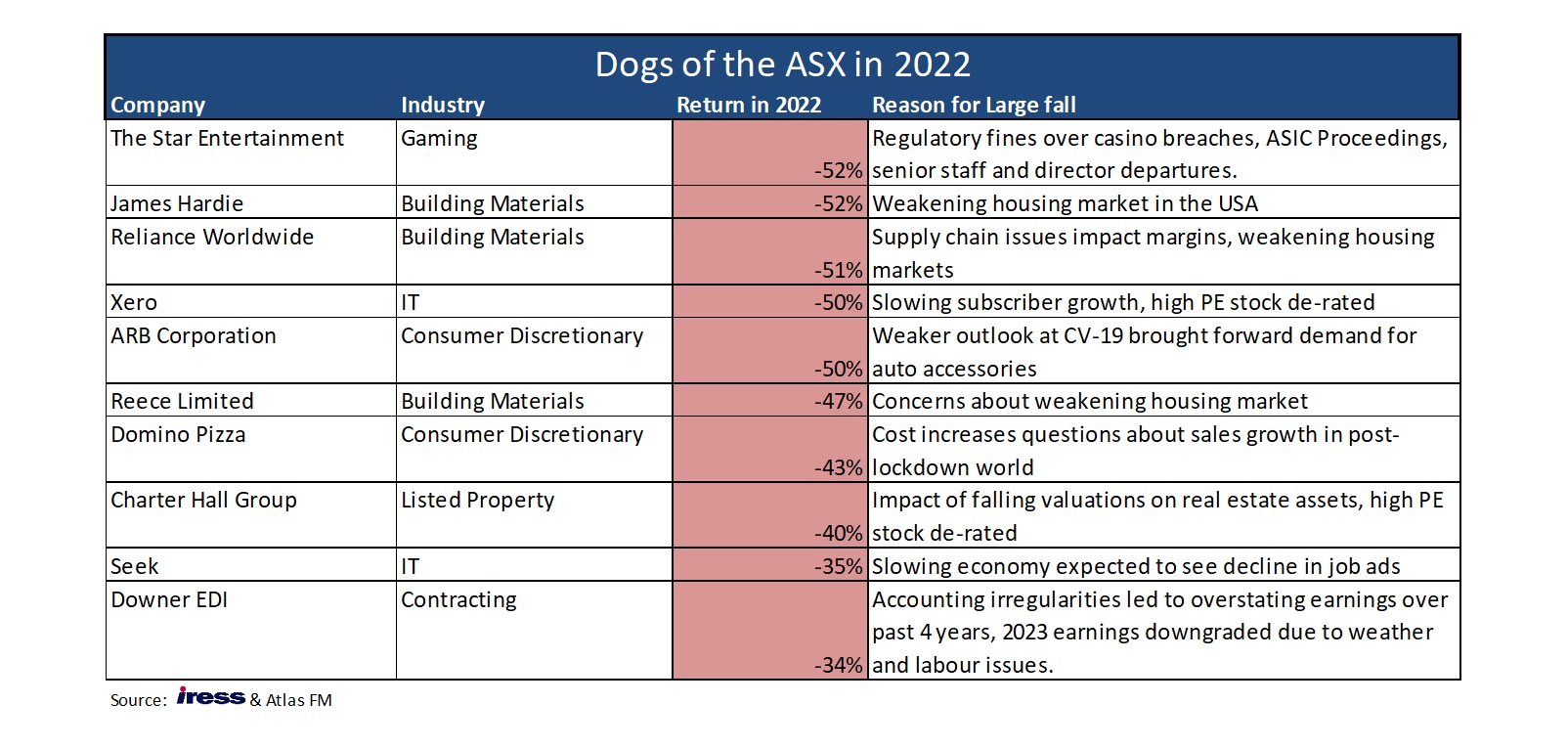Dogs of the ASX in 2022
The last 12 months have been very volatile for equity investors, with significant falls in January, June and September, offset by gradual recoveries in the other months of the year. The extreme market volatility over the past six months is very unusual and a result of a normalising of interest rates and, for many investors, their first experience with inflation. In 2022 the average Australian investor saw -1.1% from the ASX 200. While this looks like a meagre return, the ASX 200's return looks stellar compared with the S&P500 (-19%), NASDAQ (-33%) and MSCI World (-19.5%).
The slight fall in the ASX 200 over the past year masks a large dispersion in returns over 2022, with a range of energy and mining companies posting solid gains that offset significant falls in the share prices of many companies. Indeed 68 companies included in the ASX 200 index saw their share prices decline by over 20% in 2022. In January 2023, many investors will be picking through the market's trash of 2022 to find some treasure to drive portfolio returns over the coming year. Invariably several of the bottom-performing stocks will confound market expectations and stage remarkable comebacks!
In this first weekly piece of 2023, we will look at the "dogs" of the ASX from 2022, see how 2021 Dogs performed, consider some predictions for 2023, and review Atlas' predictions made 12 months ago in January 2022 Dogs of the ASX.
Dogs of the Dow
Michael O'Higgins popularised a systematic strategy of investing in underperforming companies named "Dogs of the Dow" in his 1991 book "Beating the Dow." This approach draws on the same investment principles as deep value and contrarian investors. O'Higgins advocated buying the ten worst-performing stocks over the past 12 months from the Dow Jones Industrial Average (DJIA) at the beginning of the year but restricting the stocks selected to those that are still paying a dividend.
Restricting the investment universe to a large capitalisation index like the DJIA or ASX 100 improves the chance that the unloved company may have the financial strength or understanding of capital providers (such as existing shareholders and banks) that can provide additional capital to allow the company to recover over time.
The thought process behind requiring a company to pay a dividend is that its business model is unlikely to be permanently broken if it is still paying a distribution. A company's directors are unlikely to authorise a dividend if insolvency is imminent.
The strategy then holds these ten stocks over the calendar year and sells them at the end of December. The process then restarts, buying the ten worst performers from the year that has just finished.
Retail investors have an advantage
One of the reasons this strategy persists is that institutional fund managers often report their portfolios' contents to asset consultants as part of their annual reviews. This process incentivises fund managers to sell the "dogs" in their portfolio towards the end of the year as part of "window dressing" their portfolio before being evaluated.
For example, in early 2022, fund managers with AMP (ASX: AMP) and AGL Energy (ASX: AGL) in their portfolios would have faced some stern questioning from asset consultants about why they owned these seemingly troubled companies. Many fund managers viewed AGL Energy as un-investible due to its coal-fired power generators and the hostility the company faced from the government. Similarly, AMP was viewed as a basket case by investors wearied by falling earnings and the fallout from the Financial Services Royal Commission. In 2021 private equity bidders scrapped bids after being granted the opportunity to do due diligence on the company's financials, which was taken as an ominous sign. The share prices of these two companies rebounded strongly in 2022, returning +31% (AGL Energy) and +25% (AMP) to investors brave enough to add them to portfolios last January!
Here retail investors can have an advantage over institutional investors. Their lack of scrutiny from asset consultants allows them the flexibility to pick up companies whose share prices have been under pressure late in the year that could see a rebound when the selling pressure stops in January and February. Furthermore, retail investors can afford to take a longer-term view of the investment merits of a particular company that may have hit a speed bump.
The Dogs of 2021 outperformed the ASX 200 last year

Over the past year, the average equal-weighted return of Dogs from 2021 was +1%, outperforming the ASX 200 by 2%. Solid gains in A2 Milk (ASX: A2M), AGL Energy (ASX: AGL) and Northern Star (ASX: NST) outweighed continued weakness in Magellan (ASX: MFG), Lendlease (ASX: LLC) and Afterpay (now Block) (ASX: SQ2). Over the past ten years, the Dogs of the ASX strategy has beaten the ASX 200 on six occasions. However, as a fund manager, the biggest takeaway is that there are always four to five stocks whose prospects look dreadful in early January but end the year staging a dramatic recovery in their share prices. Consequently, Atlas starts the new year by taking a close look at the most unloved companies on the ASX 100.
The common theme in the reversal of performance for the two stars of the 2021 Dogs – Northern Star and A2 Milk were improvements in the company-specific issue weighing on the share price. A2 Milk saw profits and revenue growth in the key Chinese market and found a new market in the USA. This pleasantly surprised investors after a tough 2021 when the company faced regulatory issues in China, slowing sales from closed borders and profit downgrades due to stale unsold baby formula.
Northern Star ended 2022 on a high note on more consistent production, higher realised gold prices and a $300 million share buy-back. AGL staged a dramatic turnaround in 2022 due to the combination of higher electricity prices and a takeover offer from a software billionaire looking to force AGL Energy to shift from coal power to renewable energy faster. Very few investors could have foreseen this very unconventional source of takeover interest in the electricity gentailer!
Predictions from January 2022
When we went through this exercise in January 2022, looking at which of the Dogs of 2021 would shine in 2022, Atlas correctly saw that the pain would continue for Magellan and Block. However, we underestimated the funds outflow at Magellan (Dec 21 FUM $96 billion, now $45 billion) and the degree to which high-priced US-listed tech stocks would be de-rated. Less successful was Atlas' view that A2 Milk would face a long battle to rebuild sales in China due to regulatory issues and state support of local brands over foreign brands such as A2 Milk.
On the long side, Atlas picked Orica (ASX: ORI) to bounce back on improvements in the coal market and hence the demand for explosives. This proved to be correct, with Orica gaining +10%; less so was our prediction that Lendlease would receive a takeover offer from a large pension fund seeking to access the beleaguered company's $117 billion development pipeline and growing funds management business.
Unloved mutts from 2022 in need of a good home in 2023

The list of the Dogs of the ASX from 2022 is unusual in that, unlike in previous years, it contains many companies that are generally considered high quality and would feature prominently in the portfolios of many growth-style fund managers. Indeed, an equally-weighted portfolio of these ten stocks would have returned +41% in 2021, significantly higher than the ASX 200's return of +17% in that year.
The four key themes common to the companies whose share prices struggled in 2022 are:
- High price-to-earnings companies that were de-rated based on slowing growth and higher interest rates: Xero (ASX: XRO), James Hardie (ASX: JHX) and Charter Hall (ASX: CHC).
- Slowing housing: Reliance Worldwide (ASX: RWC), Reece (ASX: REH) and James Hardie (ASX: JHX).
- COVID-19 winners that look to have peaked: ARB (ASX: ARB) and Dominos Pizza (ASX: DMP).
- Failures of corporate compliance: Star Entertainment (ASX: SGR) and Downer (ASX: DOW).
Our picks for 2023
While Atlas is currently pleased not to own any of the above ten companies in our portfolios, after analysing the Dogs of the ASX each year since 2010, several poorly-performing companies always stage dramatic turnarounds in the subsequent 12 months that confound the pessimistic market consensus. The only exception was in 2011, when the Dogs had a two-year shocker, in aggregate falling -28% after declining -26% in 2010. In 2011 the best performing "dog" was Sonic Healthcare (ASX: SHL), gaining a mere +2%!
Historically, finding the fallen angel amongst the worst performers seems to work best where the underperformance is due to stock-specific problems rather than macroeconomic issues beyond a company's control. Based on this thesis, we would be tempted to pick either Downer or Star Entertainment as candidates to shine in 2023. However, some of the issues that these companies face are likely to continue into 2023. In addition to hefty fines, Star faces the opening of the rival Crown Casino in Sydney and the prospect of new casino taxes in NSW that could see the company pay an additional $100 million per annum in tax. Downer's weather and labour issues will likely continue to impact profits, and investors face concerns that there could be accounting irregularities elsewhere in the business.
Atlas' two picks to recover in 2023 from the list of 2023 underperformers are Dominos Pizza and Reliance Worldwide. As rising mortgage payments curtail discretionary spending, Dominos should see higher sales than expected from budget-conscious consumers rewarding themselves by substituting a night out at a local restaurant for two large pizzas, garlic bread and chocolate lava cake delivered for $36.95.
Plumbing parts supplier Reliance Worldwide (ASX: RWC) had a tough 2022 due to supply issues and a weakening housing market, particularly in the USA. While sales of plumbing parts have a degree of cyclicality as they benefit from new housing, the bulk of Reliance's sales are for essential repairs, and the company's products can be installed more quickly and cheaply than traditional copper plumbing fittings. Even in a slowing economy, fixing a broken toilet or sink would be seen as a non-discretionary spend by almost all consumers.
4 topics
18 stocks mentioned



